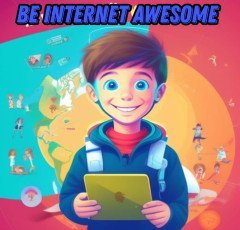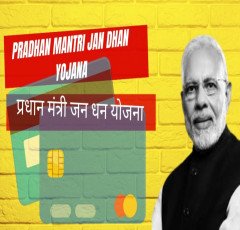
Be Internet Awesome: Helping Kids Be Safe, Confident Explorers of the Online World

In the current digital era, the internet is a big playground where children may go on thrilling adventures, learn new things, and make friends. However, young explorers must manage potential risks and difficulties, just like in the real world. It is our duty as guardians, educators, and parents to provide our kids with the skills and information they need to stay secure, in control, and responsible online.
Enter "Be Internet Awesome," a potent effort that aims to provide kids with the knowledge and fortitude they need to successfully navigate the online environment. In this blog post, we will go deeply into the world of digital parenting and examine how "Be Internet Awesome" may empower kids to safely and confidently begin their online adventures. This voyage into the world of online inquiry is for you whether you're a parent looking for advice, an educator looking for tools, or simply inquisitive about encouraging digital literacy. So let's go out on this educational journey together to learn how to make the internet a safer, more educational environment for our young digital nomads.
Introduction: Understanding the Importance of "Be Internet Awesome
The internet has permeated every aspect of our fast-paced digital world, including the lives of our children. Kids are going online more often to access educational resources, interact with friends, and explore their hobbies. The internet provides a wealth of knowledge and opportunities, but it also comes with a number of risks and difficulties that could jeopardize the safety and wellbeing of our children.
We must provide our kids the knowledge and skills they need to use the internet safely and confidently as parents, guardians, and educators. This is where "Be Internet Awesome" steps in as a helpful tool and program aimed at empowering children and assisting them in developing into responsible, knowledgeable, and resilient digital citizens.
It is crucial for kids to learn digital literacy skills and to be safe online. We must lead them through the virtual environment in the same way that we teach them about driving safety and the laws of the outside world. We'll go into the meaning of "Be Internet Awesome" and how it can significantly impact our kids' lives as they explore the online world in this blog article.
In order to give our kids a safer and more secure online experience, we'll look at the difficulties presented by the digital world, the importance of digital literacy, and the vital tools and guidelines that "Be Internet Awesome" offers. So, let's begin on this journey together and discover why "Be Internet Awesome" is a crucial resource for helping kids become secure, confident explorers of the online world.
Exploring the Digital Frontier: Children's Online Presence
The digital world has ingrained itself into children's lives all around the world. Once a novelty, the internet has developed into a vital tool for education, entertainment, and communication. It becomes clear as we examine the situation of the internet today and how it affects kids that the digital world offers both amazing advantages and major difficulties.
The Benefits of the Digital World for Kids
The Challenges of the Digital World for Kids
A key first step in directing children's online experiences is to have a thorough understanding of the advantages and drawbacks of the digital environment. The internet has a huge variety of options, but it may also be dangerous. As parents, guardians, and educators, it is our duty to provide kids with the information and resources they need to move securely and confidently through the digital frontier. At this point, programs like "Be Internet Awesome" are crucial in ensuring that our young explorers have the knowledge and abilities required to succeed in the online world.
The Digital Age Demands Digital Literacy for Children
Digital literacy is now just as crucial in today's world as traditional literacy and numeracy abilities. Children can no longer get by with only being good at reading, writing, and math. They must also have the abilities and information required to operate in the complicated and dynamic digital environment. Why is digital literacy so important for kids, and what dangers do they run if they don't have these fundamental skills?
Understanding the Importance of Digital Literacy
The Risks of an Uninformed Digital Presence
In essence, children need to be digitally literate in order to succeed in the modern digital environment. It gives individuals the ability to take advantage of online opportunities while defending themselves against risks. Initiatives like "Be Internet Awesome" are crucial tools for developing digital literacy and making sure that kids can explore the internet as safe, self-assured, and responsible citizens.
Empowering Kids with "Be Internet Awesome
One program stands out as a beacon of digital education in the effort to provide kids the abilities and information required to navigate the online world safely: "Be Internet Awesome." The urgent need for digital literacy and internet safety for children led Google to establish this curriculum.
The Origin of "Be Internet Awesome
Google created "Be Internet Awesome" in collaboration with professionals in the domains of internet safety, education, and child psychology. The project makes advantage of Google's wealth of technological expertise and dedication to making the internet a safer place for users of all ages. Google set out to create a comprehensive and entertaining platform that would promote digital literacy and online safety after realizing the difficulties and risks that kids confront in the digital age.
Promoting Digital Literacy and Online Safety
The main objective of "Be Internet Awesome" is to equip kids with the tools they need to become resilient, responsible, and knowledgeable online citizens. Five guiding concepts, each intended to address a distinct area of digital literacy and online safety, serve as the foundation for this initiative:
Through a combination of interactive games, materials, and lesson plans made for both parents and teachers, "Be Internet Awesome" reaches its objectives. These resources make learning about digital literacy fun and easy to do, giving kids the tools they need to comfortably explore the online world.
"Be Internet Awesome" is essentially a complete and priceless project that addresses the pressing need for digital literacy and online safety for children. It provides the young digital explorers of today with the tools they need to prosper in the digital world while safeguarding themselves from its potential dangers by encouraging responsible and safe online conduct.
The Five Pillars of Online Safety: Smart, Alert, Strong, Kind, and Brave
"Be Internet Awesome" is a comprehensive strategy for promoting children's digital literacy and online safety, not just a catchy catchphrase. The five fundamental concepts Smart, Alert, Strong, Kind, and Brave, each intended to transmit particular abilities that help to online safety and confidence, form the basis of this system. Let's examine how these pillars support young digital adventurers by breaking them down:
Think Clearly
Giving kids the ability to think critically will help them succeed in the digital age. It encourages children to query the data they come across online and to distinguish between trustworthy sources and dubious content. "Be Internet Awesome" encourages critical thinking, giving youngsters the tools they need to:
- Check information before assuming it to be true.
- Recognize phony news and untrue information.
- When sharing personal information, make wise choices.
- Choose reliable websites and research sources.
Pay Attention
Recognizing possible threats and maintaining vigilance are key components of alertness in the online environment. Children are educated on the value of privacy, how to spot phishing scams, and how to be cautious when interacting online. Using this pillar, children can:
- Recognize suspect online behavior and report it.
- Recognize typical strategies employed in internet scams.
- Protect their digital identity and personal information.
- Recognize the repercussions of excessive social media sharing.
Be Resilient
Building resilience and good digital citizenship are key components of being powerful online. It stresses on kindness and empathy when dealing with bad interactions like cyberbullying. The sturdy pillar supports children:
- Take appropriate action against online abuse and cyberbullying.
- Keep up a positive online reputation.
- Recognize the effect their words and deeds have on others.
- Promote a welcoming and helpful online community.
Show kindness
Being kind is a basic tenet of "Be Internet Awesome." It encourages kids to behave respectfully and empathetically toward people online just as they would in real life. According to this pillar,
- Foster a positive and caring atmosphere online.
- Prevent cyberbullying and harmful conduct.
- Teach kids to consider other people's emotions when they communicate online.
- Foster a friendlier and more caring online community.
Be Courageous
In the digital era, bravery means having the guts to ask for assistance and direction when you need it. It places a focus on having open lines of communication with reliable adults and reporting any suspicious online activity. Using this pillar, children can:
- When they get into problems online, they should contact their parents, guardians, or teachers.
- Report any online conduct that makes them feel intimidated or uneasy.
- Recognize that asking for assistance is a show of strength rather than weakness.
- Ensure their security and welfare in the online environment.
"Be Internet Awesome" equips kids to navigate the online world with assurance, resiliency, and responsibility by incorporating these five principles—Smart, Alert, Strong, Kind, and Brave—into their digital literacy curriculum. These ideas act as the cornerstones of a safer and more fulfilling digital experience, giving kids the abilities they need to succeed in the always changing digital environment.
Empowering Parents and Educators with "Be Internet Awesome" Resources
In addition to giving kids the fundamentals of digital literacy, "Be Internet Awesome" offers parents and teachers a variety of useful tools and resources. These tools are made to make teaching and counseling on online safety and digital literacy more efficient. Here, we'll examine a few of the initiative's important materials and provide connections to them.
The Family Guide
For parents and guardians, the "Be Internet Awesome" Family Guide is a thorough resource. It gives insightful analyses of the program's guiding concepts and offers helpful advice for promoting online safety and digital literacy at home. To help parents and teachers have productive discussions with kids on internet behavior, the guide includes real-world examples and discussion topics.
[Be Internet Awesome Family Guide] (https://beinternetawesome.withgoogle.com/en_us/families/guide) can be accessed.
Teacher Curriculum
"Be Internet Awesome" offers instructors a comprehensive curriculum developed to include digital literacy and online safety into the classroom. Lesson plans, exercises, and resources are all part of the curriculum and adhere to academic standards. It addresses a wide range of subjects, including encouraging virtuous digital citizenship and comprehending online privacy.
Access the Be Internet Awesome Educator Curriculum by clicking here.(https://beinternetawesome.withgoogle.com/en_us/educators)
The Interland Game
Children may practice their digital literacy skills in a fun and interactive way with Interland, a captivating online game. Kids may learn about phishing, creating strong passwords, and being kind online through game-based learning. It is a great resource for reiterating the principles from "Be Internet Awesome."
Play Interland at https://beinternetawesome.withgoogle.com/en_us/interland to access Interland.
Printable Resources
Posters and activity sheets are among the printable resources from "Be Internet Awesome" that may be utilized in both home and school settings. These resources serve as visual aids to emphasize the significance of online safety while reinforcing the program's guiding principles.
[Be Internet Awesome Printables] (https://beinternetawesome.withgoogle.com/en_us/resources) provides access to printable resources.
The Safety Pledge
Children are encouraged to take the Safety Pledge, a free resource that promotes responsible and secure online conduct. It's a useful tool for kicking off discussions about good internet behavior and setting expectations.
Visit the Be Internet Awesome Safety Pledge at https://beinternetawesome.withgoogle.com/en_us/safety-pledge to access the pledge.
Utilizing the useful information and tools made available by "Be Internet Awesome," parents and educators can teach children digital literacy skills and encourage online safety. These materials are important in developing a safer and more self-assured generation of digital adventurers, whether you're a parent hoping to direct your child's online journey or an educator looking to integrate digital literacy into your curriculum.
Incorporating "Be Internet Awesome" into Children's Lives: A Guide for Parents and Educators
The next stage is to comprehend how parents and educators may successfully integrate "Be Internet Awesome" into their children's life after exploring the useful tools it offers. For the effort to effectively promote digital literacy and online safety, it must be tailored to the individual needs and age groups of the children. The following age-appropriate teaching methods for digital literacy utilizing "Be Internet Awesome" are provided:
Young children (ages 3-6)
Elementary School (6–12 Years)
Middle School (12 to 15 years old)
Utilize the more complex resources and exercises offered by "Be Internet Awesome." Examine subjects including protecting your privacy, using secure passwords, and spotting phishing scams.
High School (15 to 18 years old)
Encourage older kids to assess online content, such as news articles and social media posts. Talk about media literacy and the significance of spotting inaccurate or biased information.
Encourage high school students to take on peer leadership roles in advancing online safety and digital literacy. They can guide discussions on pertinent subjects and assist in educating younger kids.
Children's lives must be integrated with "Be Internet Awesome" in a flexible and adaptive manner that takes into account their age and developmental stage. Parents and educators may support children in being safe, secure, and responsible digital explorers by having open discussions, using resources that are suitable for their age, and offering guidance that is personalized to their needs. Together, we can teach the future generation how to use wisdom and resiliency to navigate the digital world.
Be Internet Awesome": Making a Positive Impact in Children's Digital Lives
It's encouraging to learn about the practical effects "Be Internet Awesome" has had on kids' online experiences as we explore deeper into the subject. Children have improved their online safety and gained the confidence to responsibly explore the digital world thanks to the program's guidelines and materials. Let's look at some touching success tales from parents, educators, and students who have experienced "Be Internet Awesome"'s" great outcomes firsthand.
Providing knowledge to students
One high school teacher described how the "Be Internet Awesome" curriculum changed their pupils' attitude about conducting online research in their success story. Students who used the application in their courses developed a more critical eye for online sources, actively checking facts and citing trustworthy sources. They gained a sense of responsibility for using reliable sources thanks to their newly acquired digital literacy, which is an important ability that will help them in their academic careers and beyond.
Promoting online goodwill
A parent described how "Be Internet Awesome" assisted them in guiding their child through the challenges of social media. The program's contents served as a springboard for discussions in which their youngster learnt the value of online kindness. As a result of their improved knowledge, they started fostering a climate of respect and empathy among their peers, which resulted in a positive change in their online interactions. The parent has felt both pleasure and comfort in seeing their child progress in this area.
Increasing Digital Resilience
A middle school teacher described the significant influence "Be Internet Awesome" had on her kids' capacity to deal with cyberbullying. Students developed the self-assurance to respond to cyberbullying situations positively as a result of training on digital resilience and talks on online behavior. The instructor noticed an improvement in the online classroom's climate and an uptick in student self-esteem, which helped to create a safer and more encouraging online community.
Promoting Honest Communication
The "Be Internet Awesome" Safety Pledge opened a line of communication with their child, according to a parent who shared a success story. Their child felt at ease discussing and signing the commitment after they had discussed it together. A strong parent-child relationship was formed as a result of the parent's newly discovered openness, which also improved the child's online safety.
These success tales demonstrate the real advantages of "Be Internet Awesome" in giving kids the skills they need to responsibly and with confidence navigate the online world. The program has demonstrated its efficacy in enhancing children's online experiences, whether it be by cultivating compassion online, enhancing research abilities, preventing cyberbullying, or enhancing parent-child communication. It demonstrates the significance of digital literacy and the possibility for significant change when we provide young digital adventurers with the appropriate resources and education.
The Key to Online Safety: Open Dialogue Between Adults and Children
It is crucial for adults and kids to have honest conversations regarding internet activity in the current digital era. Such communication not only fosters trust but is essential for preserving the security and welfare of adolescent internet users. Let's explore the importance of open communication and offer helpful advice for developing and sustaining it:
The Value of Open Communication
Suggestions for Starting and Keeping Communication
A fundamental component of digital literacy and online safety is honest communication between adults and kids about online activity. By encouraging this dialogue, we provide young digital nomads the tools they need to make moral decisions, ask for help when they need it, and succeed in the digital sphere while remaining safe and secure.
Conclusion: Nurturing Digital Explorers with "Be Internet Awesome
The significance of encouraging digital literacy and online safety cannot be stressed in the digital age, since the internet world is a significant part of children's lives. We've learned about the revolutionary effect that the "Be Internet Awesome" project has had on kids' online experiences as we travel across its worlds. "Be Internet Awesome" provides young explorers with the abilities and information they need to appropriately navigate the digital environment, from instilling critical thinking to cultivating digital kindness.
Important conclusions from our investigation include:
Let's keep in mind that the digital world is a dynamic and constantly changing landscape as we come to a close on this voyage. We give kids the tools they need to explore this world with intelligence, resilience, and responsibility by encouraging digital literacy and online safety. We give them the tools they need to design their own digital futures, making wise decisions and confidently navigating the online world.
We urge all parents, guardians, and teachers to look into "Be Internet Awesome" and take use of the amount of information it provides. We make a big step in raising a generation of responsible, safe, and digital explorers by incorporating the program's ideals and resources into our kids' lives.
Together, let's set out on this digital journey to create a better secure and educational online environment for our children. By providing them with the tools and information they need to succeed in the digital age, we make sure they not only survive but also thrive in it.






















 Amazon Best Selling Products
Amazon Best Selling Products  TitTok Revolution
TitTok Revolution  NordVPN
NordVPN  The Click Engine
The Click Engine  Artificial Intelligence
Artificial Intelligence  Women Fashion
Women Fashion  Hello Theme
Hello Theme  Creative Brief For Video Shoot
Creative Brief For Video Shoot  ELECTRONIC ACCESSORIES
ELECTRONIC ACCESSORIES  RPM 3.0
RPM 3.0  All Wireless Products
All Wireless Products  Men Clothing
Men Clothing  Hot Bags For Pain Relief
Hot Bags For Pain Relief  Unreal Engine 5 For Beginners Learn The Basics Of Virtual Production
Unreal Engine 5 For Beginners Learn The Basics Of Virtual Production  Top Rated From Amazon
Top Rated From Amazon  Online Marketing
Online Marketing  ASPINAL LONDON
ASPINAL LONDON  One World Collection
One World Collection  Best Robotic Vacuum Cleaners
Best Robotic Vacuum Cleaners  NordLocker
NordLocker  Acer Laptop
Acer Laptop  Smart Doorbell
Smart Doorbell  SOFAS
SOFAS  Online Technology Classes
Online Technology Classes  ASUS Laptop
ASUS Laptop  SEO Checklist
SEO Checklist  Best Home Appliances
Best Home Appliances  Only For The United States
Only For The United States  BEST SELLER TOP10
BEST SELLER TOP10  Best Sellers On Amazon
Best Sellers On Amazon  NordPass
NordPass  Favorite Company (Cuelinks)
Favorite Company (Cuelinks)  1150+Trendy kids coloring pages Bundle
1150+Trendy kids coloring pages Bundle  Sennheiser
Sennheiser  Graphics & Design
Graphics & Design  Unlimited access to classes on illustration, photography, design, film, music
Unlimited access to classes on illustration, photography, design, film, music  Best Selling Books
Best Selling Books  The Secret Email System
The Secret Email System 
















